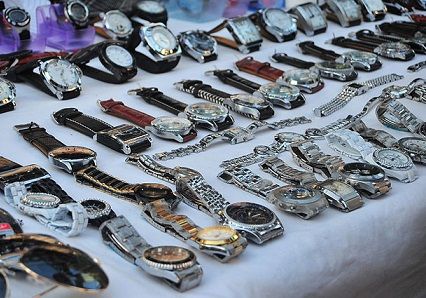One of the major problems consumers face can be checking whether a designer product or a medicine is the real thing or a cheap (and potentially dangerous) counterfeit. Researchers at the University of Copenhagen have come up with a chemical fingerprint tag that together with a mobile app can solve the problem immediately. The app has been tested and found to be 100 percent accurate.
“You can put it on a bottle of wine, a gold watch, a painting – in fact anything. The tag doesn’t have to be any bigger than a comma and it is impossible to copy,” said researcher and assistant professor Thomas Just Sørensen.
All in a database
The tag consists of a very small amount of transparent ink containing different microparticles that is sprayed onto a barcode – for example on paper. The particles form a unique pattern when sprayed on and each one is unique.
Items can be tagged at the factory and the tags registered in a database. The tag can be scanned by the customer with an ordinary mobile phone containing an app that will check to see whether there is a match with the database.
DTU to head up new energy project
The Technical University of Denmark (DTU) has been given 1 million euros by the European Commission towards a new project entitled Energy-X, which is expected to contribute towards preparing the EU’s future strategy within energy research. Energy-X involves 13 European universities and research institutions, as well as 29 companies. The project focuses on the problem of how to obtain sufficient energy and materials for the world’s increasing population as well as minimising the environmental effects and the effects on climate.
NOAH to assist cities reduce run-off water
It seems pretty clear that climate change will lead to more frequent storms and cloudbursts, as well as the challenges this brings in terms of run-off water. A number of cities around the Baltic are co-operating to develop a tool called NOAH designed to help alleviate problems in connection with heavy rainfall and flooding that existing drainage systems can’t handle. Nine cities and seven universities are involved with NOAH as well as two umbrella organisations from around the Baltic. The Technical University of Denmark (DTU) will be contributing with its expertise in modelling and real-time control.
Melting ice leaves potential silver lining in Greenland
Climate change has led to a greatly accelerated rate of inland ice melting in Greenland. However, this is not only a problem. New research reveals that enormous amounts of sand and silt are being deposited along the coast and these could be potentially extremely valuable. Global sand reserves are running out and increased urbanisation and infrastructural improvements worldwide are creating a massive demand for sand and gravel, so prices are expected to rocket. Research from the University of Copenhagen reveals that around 8 percent of the world’s total amount of sand already comes from Greenland – an amount that is expected to increase due to global warming.













